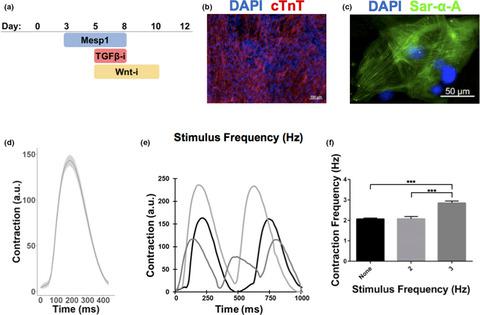当前位置:
X-MOL 学术
›
Dev. Growth Differ.
›
论文详情
Our official English website, www.x-mol.net, welcomes your feedback! (Note: you will need to create a separate account there.)
Dual TGFβ and Wnt inhibition promotes Mesp1‐mediated mouse pluripotent stem cell differentiation into functional cardiomyocytes
Development, Growth & Differentiation ( IF 2.5 ) Pub Date : 2020-10-13 , DOI: 10.1111/dgd.12694 Matthew P Pappas 1 , Lindsay N Peifer 1 , Sunny S K Chan 1, 2
Development, Growth & Differentiation ( IF 2.5 ) Pub Date : 2020-10-13 , DOI: 10.1111/dgd.12694 Matthew P Pappas 1 , Lindsay N Peifer 1 , Sunny S K Chan 1, 2
Affiliation

|
Efficient derivation of cardiomyocytes from mouse pluripotent stem cells has proven challenging, and existing approaches rely on expensive supplementation or extensive manipulation. Mesp1 is a transcription factor that regulates cardiovascular specification during embryo development, and its overexpression has been shown to promote cardiogenesis. Here, we utilize a doxycycline‐inducible Mesp1‐expressing mouse embryonic stem cell system to develop an efficient differentiation protocol to generate functional cardiomyocytes. Our cardiac differentiation method involves transient Mesp1 induction following by subsequent dual inhibition of TGFβ and Wnt signaling pathways using small molecules. We discovered that whereas TGFβ inhibition promoted Mesp1‐induced cardiac differentiation, Wnt inhibition was ineffective. Nevertheless, a combined inhibition of both pathways was superior to either inhibition alone in generating cardiomyocytes. These observations suggested a potential interaction between TGFβ and Wnt signaling pathways in the context of Mesp1‐induced cardiac differentiation. Using a step‐by‐step approach, we have further optimized the windows of Mesp1 induction, TGFβ inhibition and Wnt inhibition to yield a maximal cardiomyocyte output – Mesp1 was induced first, followed by dual inhibition of TGFβ and Wnt signaling. Our protocol is capable of producing approximately 50% of cardiomyocytes in 12 days, which is comparable to existing methods, and have the advantages of being technically simple and inexpensive. Moreover, cardiomyocytes thus derived are functional, displaying intrinsic contractile capacity and contraction in response to electric stimulus. Derivation of mouse cardiomyocytes without the use of growth factors or other costly supplementation provides an accessible cell source for future applications.
中文翻译:

双 TGFβ 和 Wnt 抑制促进 Mesp1 介导的小鼠多能干细胞分化为功能性心肌细胞
从小鼠多能干细胞有效衍生心肌细胞已被证明具有挑战性,现有方法依赖于昂贵的补充或广泛的操作。Mesp1 是一种转录因子,可在胚胎发育过程中调节心血管特性,其过表达已被证明可促进心脏发生。在这里,我们利用多西环素诱导的 Mesp1 表达小鼠胚胎干细胞系统来开发一种有效的分化方案来产生功能性心肌细胞。我们的心脏分化方法涉及瞬时 Mesp1 诱导,随后使用小分子对 TGFβ 和 Wnt 信号通路进行双重抑制。我们发现,虽然 TGFβ 抑制促进了 Mesp1 诱导的心脏分化,但 Wnt 抑制是无效的。尽管如此,两种途径的联合抑制在产生心肌细胞方面优于单独抑制。这些观察结果表明,在 Mesp1 诱导的心脏分化的背景下,TGFβ 和 Wnt 信号通路之间存在潜在的相互作用。使用循序渐进的方法,我们进一步优化了 Mesp1 诱导、TGFβ 抑制和 Wnt 抑制的窗口,以产生最大的心肌细胞输出——首先诱导 Mesp1,然后是 TGFβ 和 Wnt 信号的双重抑制。我们的协议能够在 12 天内产生大约 50% 的心肌细胞,这与现有方法相当,并且具有技术简单和成本低廉的优点。此外,由此衍生的心肌细胞是有功能的,表现出内在的收缩能力和响应电刺激的收缩。
更新日期:2020-11-09
中文翻译:

双 TGFβ 和 Wnt 抑制促进 Mesp1 介导的小鼠多能干细胞分化为功能性心肌细胞
从小鼠多能干细胞有效衍生心肌细胞已被证明具有挑战性,现有方法依赖于昂贵的补充或广泛的操作。Mesp1 是一种转录因子,可在胚胎发育过程中调节心血管特性,其过表达已被证明可促进心脏发生。在这里,我们利用多西环素诱导的 Mesp1 表达小鼠胚胎干细胞系统来开发一种有效的分化方案来产生功能性心肌细胞。我们的心脏分化方法涉及瞬时 Mesp1 诱导,随后使用小分子对 TGFβ 和 Wnt 信号通路进行双重抑制。我们发现,虽然 TGFβ 抑制促进了 Mesp1 诱导的心脏分化,但 Wnt 抑制是无效的。尽管如此,两种途径的联合抑制在产生心肌细胞方面优于单独抑制。这些观察结果表明,在 Mesp1 诱导的心脏分化的背景下,TGFβ 和 Wnt 信号通路之间存在潜在的相互作用。使用循序渐进的方法,我们进一步优化了 Mesp1 诱导、TGFβ 抑制和 Wnt 抑制的窗口,以产生最大的心肌细胞输出——首先诱导 Mesp1,然后是 TGFβ 和 Wnt 信号的双重抑制。我们的协议能够在 12 天内产生大约 50% 的心肌细胞,这与现有方法相当,并且具有技术简单和成本低廉的优点。此外,由此衍生的心肌细胞是有功能的,表现出内在的收缩能力和响应电刺激的收缩。



























 京公网安备 11010802027423号
京公网安备 11010802027423号